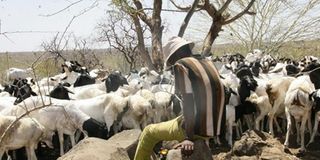Bank to the rescue of poor livestock farmers in arid regions

A farmer with his goats in Marsabit County on February 19, 2015. FILE PHOTO | KEN BETT |
What you need to know:
- The KCB Foundation launched the "Mifugo Ni Mali" livestock value chain development programme.
- The Mifugo Ni Mali programme will support a dedicated column that provides practical information on ways of enhancing productivity.
Kenya's lucrative livestock sector is finally on a growth path, after years of stagnation, neglect and under-investment.
A close look at the latest developments in the sector shows that the government and private sector players are giving the sector more attention, positioning it as a mainstream economic growth driver.
The arid and semi-arid lands (ASALs) are home to 70 per cent of Kenya’s livestock and, due to historical alienation, the challenges faced in these regions are manifest in the livestock sector.
In a bid to eradicate extreme poverty, the KCB Foundation launched the "Mifugo Ni Mali" livestock value chain development programme targeting livestock keepers in the ASALs with a view of commercialising the sector and ensuring that the livestock keeper retains a higher proportion of the final sale price of the animals.
The programme involves market organisation through cooperatives/collectives and support for farmer-owned enterprises to address productivity, nutrition and husbandry challenges in addition to the provision of appropriate financial services.
The programme is currently under way in Baringo, Taita-Taveta, Narok and Kwale counties. By the end of 2015, the programme will be scaled up into Laikipia, Kilifi, Samburu, Tana River and Mombasa counties.
A memorandum of understanding is signed with participating counties where the county commits to provide resources for extension services, disease management and market upgrade while the KCB Foundation supports the cooperatives to enhance services to members. A business model is used in evaluating the cooperatives to be financed with the interest-free loans.
Areas funded include breed improvement, animal feed and commercial fodder production, animal health services, value chain trade, market access initiatives, value addition and working capital.
Disease management, animal husbandry and nutrition remain the most significant challenges to livestock keepers in the ASALs. The Mifugo Ni Mali programme provides interest-free loans to cooperatives to develop farmer-owned business enterprises seeking to provide lasting solutions to these perennial problems stagnating the sector.
In addition, KCB Foundation is supporting mass media initiatives that educate livestock keepers on disease, nutrition, animal husbandry and management and further partnered with various institutions and county governments in outreach activities.
Through a partnership with Seeds of Gold, the Mifugo Ni Mali programme will support a dedicated column that provides practical information on ways of enhancing productivity and increasing incomes for ASAL livestock keepers.
Experts in livestock matters will provide much needed advice and information on ASAL livestock value chains and this includes bee keepers, fish farmers, sheep, goats, cows and camel keepers.
It has been observed that there is a significant shortage of information in the public domain that is easily accessible to livestock keepers in the ASALs yet there is a wealth of knowledge and expertise with various local actors including academic institutions.
Mifugo Ni Mali is committed to commercialising the livestock sector in the ASALs. A combination of credit, equity and grants is used in the programme for the various components.
To benefit from the programme livestock keepers must be in duly registered cooperatives and the county government must be involved in driving and coordinating the programme for sustainability.
Have any question on nutrition, disease management and funding of livestock businesses? Send your questions to Mifugo ni Mali on [email protected]




